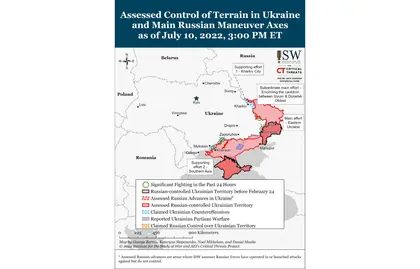Key Takeaways
- Russian forces are conducting a theater-wide operational pause in Ukraine and engaging in operations to set conditions for future offensives.
- Russian forces conducted limited probing operations northwest of Slovyansk.
- Russian forces are likely intensifying artillery and missile strikes west of Bakhmut in order to isolate the city from critical ground lines of communication (GLOCs).
- Russian forces conducted a limited and unsuccessful ground attack north of Donetsk City.
- Russian military leadership continues to form ad hoc volunteer units and private military company combat organizations partly comprised of older men and criminals to support operations in Ukraine.
Russian forces are in the midst of a theater-wide operational pause in Ukraine.
JOIN US ON TELEGRAM
Follow our coverage of the war on the @Kyivpost_official.
This operational pause has been largely characterized by Russian troops regrouping to rest, refit, and reconstitute; heavy artillery fire in critical areas to set conditions for future ground advances; and limited probing attacks to identify Ukrainian weakness and structure appropriate tactical responses. As ISW has previously noted, an operational pause does not mean a complete cessation of hostilities, rather that ongoing hostilities are more preparative in nature.
Russian milblogger Rybar provided more evidence of tensions between the Russian military command and Russian war correspondents.
Russian war correspondents include journalists operating at the frontlines and Russian milbloggers commentating on information available in the open-source (and likely also drawn from friends in the military). Rybar noted that Russian military commanders responsible for wartime information operations are attempting to silence Russian milbloggers and war correspondents to conceal the Russian military’s blunders during the invasion of Ukraine. Rybar noted that Russian military commanders remain shaped by negative experiences during the Chechnya wars when war correspondents exposed problems at the frontline to the Kremlin and embarrassed Russian officers.
Rybar stated that the Russian Defense Ministry and possibly actors within the presidential administration are actively attempting to silence unofficial coverage of the Russian war in Ukraine.

Trump Makes 90 Day Foreign Aid Freeze – Ukraine Military Support Supposedly Untouched
Rybar expressed support for a Telegram article by Donetsk People’s Republic (DNR) Deputy Information Minister (and milblogger) Daniil Bezsonov that criticized the Kremlin’s apparent effort to promote self-censorship among war correspondents. Rybar noted that Adviser to the Russian Defense Minister Andrey Ilnitsky called for such self-censorship on May 26 and had encouraged Russian war correspondents to report on the war only from an ideological standpoint without getting into operational details. Rybar speculated that the presidential administration or other Russian officials ordered Ilnitsky to promote censorship among war correspondents who publish frontline updates in real-time.
Rybar noted that the relationship between the Russian military command and war correspondents particularly soured after Russian President Vladimir Putin met with war correspondents during the St. Petersburg Economic Forum on June 17.
Rybar claimed that two prominent war correspondents told Putin about the “mess” at the frontlines during the closed-door meeting, effectively bypassing the Russian Defense Ministry in presenting their negative views directly to the commander in chief. The event Rybar is describing likely occurred: Kremlin Spokesperson Dmitry Peskov announced on June 12 that Putin would hold a largely closed-door meeting with Russian war correspondents, and Russian propagandist Margarita Simonyan confirmed that Putin had a “candid” and long conversation with frontline journalists after the event. Rybar noted that Russian Defense Ministry began to identify war correspondents as a “threat” after this engagement whereas previously it had perceived them as a “poorly controlled problem.”
Putin likely held the June 17 meeting to defuse milblogger discontent, which had become evident and dramatic after the disastrous failed river crossing attempt at Bilohorivka in mid-May. If that was his aim, he failed to win them over, as the milbloggers have remained staunchly critical of the way the Russian high command is waging the war ever since. But Putin may also have obtained a more unvarnished view of what is occurring on the frontlines than he was getting from the chain of command.
The Russian information space would change significantly if the Ministry of Defense cracked down on the milbloggers and stopped them from operational reporting.
ISW uses milbloggers and Russian war correspondents as sources of Russian claims on a daily basis, so the elimination of regular milblogger operational reporting would affect ISW’s approach to coverage. We will continue to observe and report on milblogger and war correspondent behavior and will flag significant changes in the Russian information space as we observe them.
Russian milbloggers are increasingly criticizing Russian strategy and military leadership by seizing upon recent successful Ukrainian strikes against Russian rear areas.
Russian milblogger Voennyi Osvedomitel’ underlined the threat posed by Western-provided high mobility artillery rocket system (HIMARS) and stated that HIMARS will complicate Russian logistics in a Telegram post on July 9. Voennyi Osvedomitel’ cautioned that Russian air defense may be increasingly insufficient against Ukrainian strikes and called on Russian forces to improve coordination between intelligence and aviation in order to identify and target Western-provided weapons systems. Another milblogger with a small following, Nam Pishut iz Yaniny, complained that Russian military leadership is proving unable to defend against Western weapons being used against Russian positions, Igor Girkin, a Russian nationalist who previously commanded militants during operations in Donbas in 2014, discussed recent Ukrainian strikes against Russian rear areas and criticized Russian troops for not targeting Ukrainian ground lines of communication (GLOCs) along which HIMARS and other Western weapons are delivered. Girkin suggested that the ongoing operational pause is exposing easily-exploitable Russian vulnerabilities and called for Russian troops to start fighting in full force again. Girkin and other milbloggers are likely to continue voicing their discontent with Russian military leadership as Ukrainian capabilities are strengthened by Western weaponry and equipment.
Written by Karolina Hird, Kateryna Stepanenko, Grace Mappes, and Frederick W. Kagan
Read the full report here.
You can also highlight the text and press Ctrl + Enter










